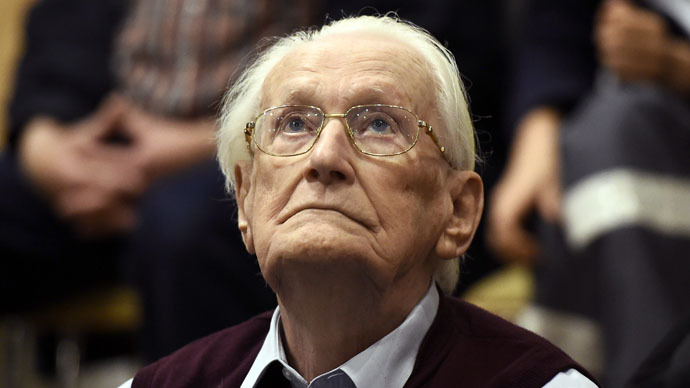94yo ex-Auschwitz guard found guilty of 'accessory to murder' of 300,000 Jews

A 94-year-old former SS sergeant who served at the Auschwitz death camp in 1944 has been convicted on 300,000 counts of accessory to murder and given a four-year sentence by a German court.
The trial at the state court in Lueneburg, northern Germany, provided an answer to the rhetorical question of whether people who were cogs in the Nazi wheel were equally guilty of crimes committed against 6 million Jews killed during the Holocaust.
The charges against Oskar Groening go back to a period of roughly three months, between May and July 1944, when 137 trains carrying as many as 425,000 Jews from Hungary arrived in Auschwitz. At least 300,000 prisoners were put to death in the gas chambers of Auschwitz, the indictment stated.
Nonagenarian Oskar Groening testified that he guarded prisoners' baggage after they arrived at Auschwitz. He was tasked with collecting money stolen from the Jews, counting it and sending cash to SS offices in Berlin to fund the Nazi military tour de force.
Groening was only 21 when he was sent to work at the camp in 1942. By Groening's own concession, he was an enthusiastic Nazi back then. Although he did not kill anyone himself, prosecutors stated that his stint in Auschwitz amounted to helping the death camp in Nazi-occupied Poland function at the particular time when hundreds of thousands of Jews from Hungary were brought to the Auschwitz-Birkenau complex. Most were gassed to death without delay.

Groening's defense had called for him to be acquitted, emphasizing that he did not facilitate mass murder in his capacity as a bookkeeper. But according to Jens Lehmann, the lawyer for a group of Auschwitz survivors and relatives of victims who are joint plaintiffs in the case, "by sorting the bank notes he helped the Nazi regime to benefit economically."
When his trial opened in April, Groening admitted moral guilt for atrocities at the camp, adding it was now up to the court to state whether he was guilty under criminal law.
"I stand before the victims with remorse and humility," Groening said on the first day of his trial.
"On the question of whether I am guilty in legal terms, you must decide," he added, Reuters reported.
Auschwitz survivors traveled from the US, Canada and Hungary, just to name a few, to attend the trial. Toronto resident Max Eisen, 86, said he was "very disappointed" with Groening's testimony.
"There are a lot of untruths here," Eisen, whose parents, three siblings, grandparents, aunt and uncle were all killed at the camp, told Reuters.
"It needs to be written somewhere that he committed a crime. To let him get away with it would be bad," he added.
In April, Groening described some of the murders that he witnessed at Auschwitz. He once saw an SS officer grabbing a crying baby and slamming its head against a truck until the baby was quiet. "I was so shaken," Groening recalled, later asking his commander for a transfer from Auschwitz.

He also mentioned an incident in late 1942 when he witnessed Jews being taken to a converted farm house near the camp. An officer shut the door, put on a gas mask, opened a can and poured its contents down a hatch. "The screams became louder and more desperate, but after a short time they became quieter again," Groening said, according to Reuters.
"This is the only time I participated in a gassing," he said, adding, "I don't mean participated, I mean observed."
Groening had previously confessed he felt "nothing" when he saw Jews put to death in the gas chambers.
"If you are convinced that the destruction of Judaism is necessary, then it no longer matters how the killing takes place," he told Der Spiegel in 2005.
In May, the court decided to limit the time Groening spent in court to only three hours a day due to his health problems.
In past years, Frankfurt prosecutors decided not to pursue the case against the elderly man and other concentration camp workers, saying there was no direct link between their actions and the atrocities at the death camp. Prosecutors in Hanover disagreed, however, encouraged by the case of Ivan Demjanjuk, a Ukrainian who in 2011 was convicted of being an accessory to mass murder even though there was no evidence of a specific crime he committed while a guard at the Sobibor extermination camp in Nazi-occupied Poland. Demjanjuk, who emigrated to the US after World War II, died in a German care home in 2012, aged 91.
According to a professor of law at the University of Cologne, Cornelius Nestler, of the 6,500 SS members who worked in Auschwitz-Birkenau, only 49 have been convicted of war crimes in Germany. He told the New York Times that Germans “should be happy that now, finally, the right thing is being done.”












